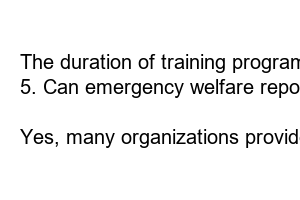긴급복지 신고의무자 교육
Title: Emergency Welfare Reporter Training: Ensuring Effective Crisis Response
Introduction:
In times of crisis, accurate and timely reporting on emergency welfare situations becomes paramount. Trained welfare reporters play a crucial role in ensuring that vital information reaches those in need, facilitating effective response efforts. This blog post delves into the significance of emergency welfare reporter training, highlighting its role in enhancing crisis management and providing immediate assistance to vulnerable communities.
1. The Purpose of Emergency Welfare Reporter Training:
Emergency welfare reporter training equips individuals with the necessary skills to observe, analyze, and disseminate accurate information during crises. Through specialized training programs, reporters gain the ability to report on various situations, including natural disasters, humanitarian crises, and public health emergencies.
2. Key Skills and Techniques Taught in Training:
Training programs focus on enhancing essential skills such as *information gathering*, *interviewing*, and *writing concise reports*. Reporters are trained to express empathy and compassion while maintaining objectivity, ensuring that their reporting provides a comprehensive understanding of the crisis at hand.
3. Efficient and Immediate Reporting:
With emergency welfare reporter training, journalists can swiftly gather critical information and relay it to relevant authorities and relief agencies. This helps streamline response efforts, ensuring that those impacted by the crisis receive the necessary aid in a timely manner.
4. Collaborating with Emergency Responders:
Trained reporters act as a bridge between communities affected by a crisis and emergency responders. By providing accurate and up-to-date reports, they assist in directing resources and support to the areas that require immediate attention.
5. Utilizing Technology for Enhanced Reporting:
Emergency welfare reporter training emphasizes the use of technology and digital tools to amplify the outreach of critical information. Reporters are taught to leverage social media platforms, mobile applications, and other digital resources to inform affected communities, raise awareness, and seek assistance.
6. Safeguarding Ethical Reporting:
Ethics and integrity are fundamental in emergency reporting. Journalists undergo training in ethical reporting practices, including obtaining informed consent, respecting privacy, and sensitively handling traumatic stories. This ensures that their reporting not only informs but also respects the dignity and rights of those affected by the crisis.
7. The Value of Collaborative Networks:
Emergency welfare reporter training also emphasizes the importance of collaboration and networking. By bringing reporters together in forums, workshops, and conferences, mutual learning and sharing of best practices are encouraged. This contributes to the growth and development of emergency reporting as a discipline.
Summary:
Emergency welfare reporter training empowers individuals to report on emergency situations effectively, ensuring that crucial information reaches the right channels promptly. By enhancing skills and employing technology, these reporters become an invaluable asset in crisis response efforts. Through ethical reporting and collaborative networks, their contributions lead to more efficient and compassionate crisis management, serving vulnerable communities during their time of need.
FAQs:
1. Who can undergo emergency welfare reporter training?
Emergency welfare reporter training is open to anyone interested in enhancing their reporting skills and contributing to crisis response efforts, including journalists, bloggers, and citizen reporters.
2. Are there specific training programs for different types of crises?
Yes, many training programs cater to specific crisis scenarios, such as disaster reporting, conflict situations, public health emergencies, and humanitarian crises.
3. Can I volunteer as an emergency welfare reporter without formal training?
While formal training is highly recommended, some organizations may offer volunteering opportunities alongside training programs, allowing participants to gain practical experience under supervision.
4. How long does emergency welfare reporter training typically last?
The duration of training programs varies, ranging from a few days to several weeks or months, depending on the level of expertise and the depth of knowledge to be acquired.
5. Can emergency welfare reporters work internationally?
Yes, trained reporters can contribute to emergency reporting globally. There are networks and organizations that offer opportunities to report on crises worldwide.
6. Is emergency welfare reporter training offered online?
Yes, many organizations provide online training programs, enabling participants to access learning materials and resources remotely. Online training also allows for flexibility in scheduling and participation.

